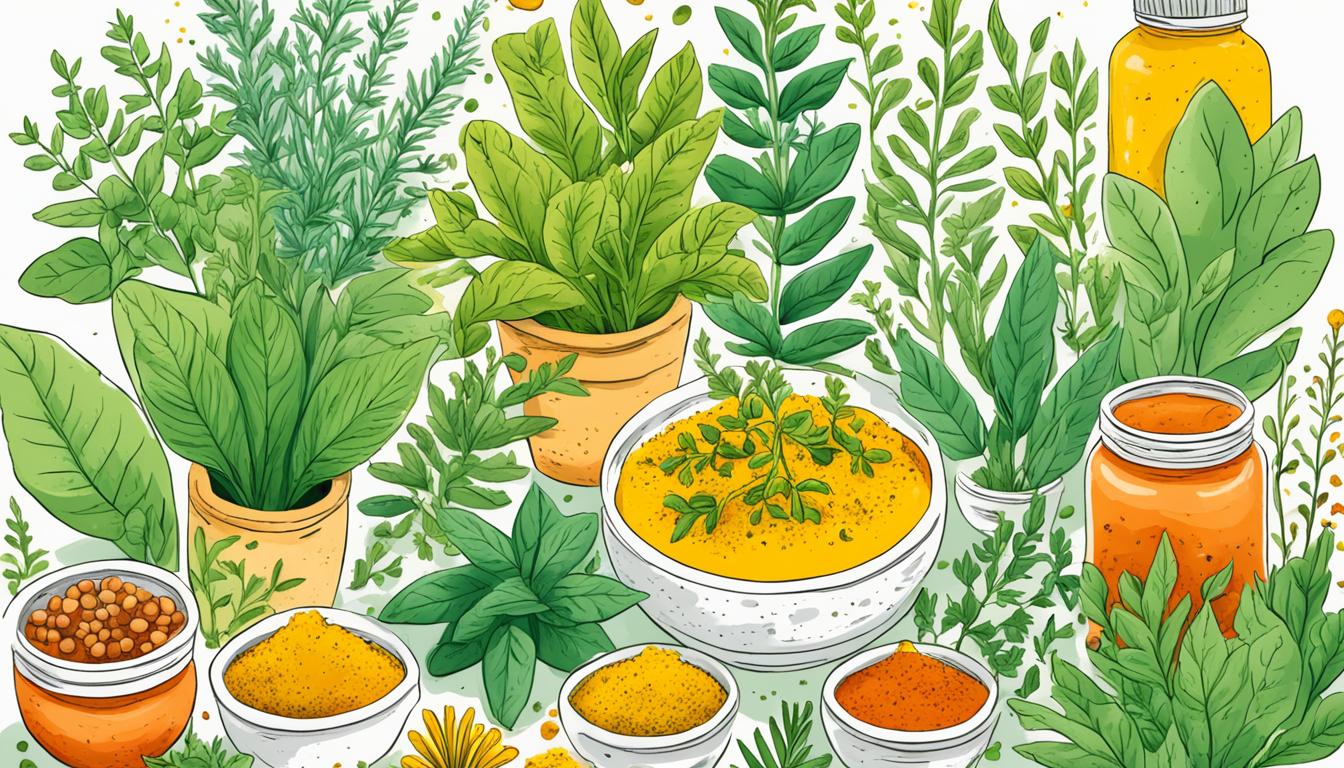Are you searching for a natural solution to reduce inflammation in your body? Discover the power of herbal remedies that can provide effective relief without the side effects of traditional medications.
Chronic inflammation has been linked to various diseases, including diabetes and cancer. Fortunately, nature has provided us with a range of herbs and spices that contain potent anti-inflammatory compounds. These natural remedies offer a plant-based alternative to traditional treatments and can be easily incorporated into your daily life.
In this article, we will explore 9 herbal remedies that have been scientifically studied for their ability to fight inflammation. From ginger to turmeric, garlic to cardamom, we will uncover the healing properties and benefits of these powerful herbs and spices. Are you ready to discover the natural way to soothe your body’s inflammatory response?
Ginger: A Powerful Anti-inflammatory Herb
Ginger, known for its healing properties, has been used in traditional medicine for centuries. This remarkable herb contains over 100 active compounds, including gingerol, shogaol, zingiberene, and zingerone, which possess impressive anti-inflammatory properties. These compounds work synergistically to reduce inflammation in the body and offer numerous health benefits.
Several studies have shown that ginger can significantly reduce inflammatory markers, including C-reactive protein (CRP) and tumor necrosis factor-alpha (TNF-α), which play a crucial role in promoting inflammation. By actively suppressing these markers, ginger helps to alleviate inflammation and restore balance in the body.
Ginger also exhibits promising effects in relieving joint pain and increasing joint mobility, particularly in individuals with osteoarthritis, a degenerative joint disease characterized by chronic inflammation. Regular consumption of ginger, whether fresh, dried, powdered, or in supplement form, may help reduce joint pain, enhance joint function, and improve overall joint mobility.
Whether you enjoy a warm cup of ginger tea, add fresh ginger to your meals, or take ginger supplements, incorporating this potent herb into your routine can offer natural, effective relief from inflammation and its associated symptoms.
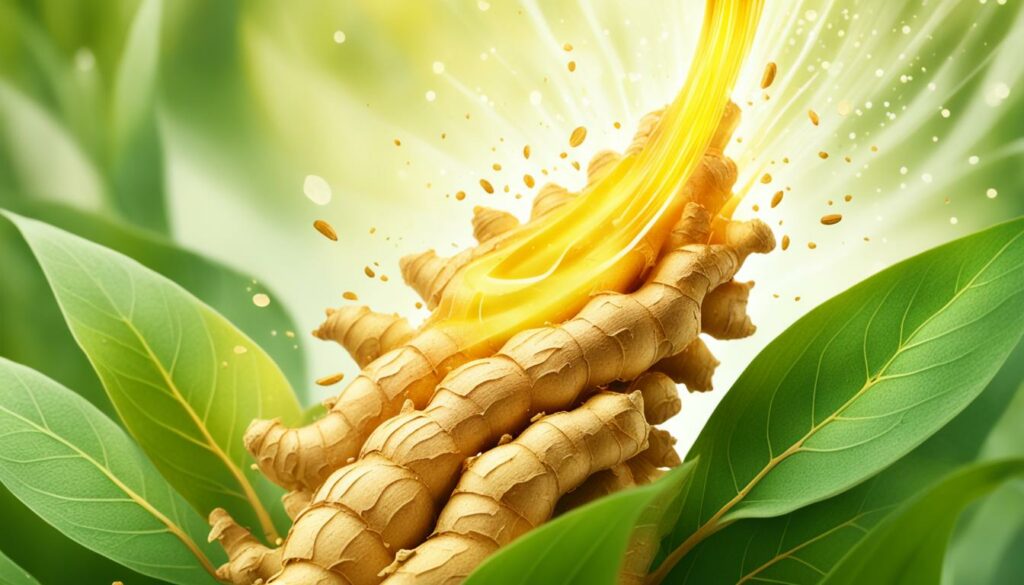
Garlic: An Anti-inflammatory Spice
Garlic has been a staple ingredient in cooking and traditional medicine for thousands of years. Its strong smell and taste are attributed to sulfur compounds, including allicin, diallyl disulfide, and S-allylcysteine, which possess remarkable anti-inflammatory properties.
Studies have shown that garlic can effectively reduce inflammatory markers like C-reactive protein (CRP) and tumor necrosis factor-alpha (TNF-α). Furthermore, garlic has been found to enhance antioxidant levels in the body, such as glutathione (GSH), and regulate inflammation-promoting markers like interleukin 10 (IL-10) and nuclear factor-κB (NF-κB).
One notable form of garlic, aged garlic extract, has been particularly successful in reducing inflammation. Aged garlic extract undergoes a unique aging process that enhances its bioavailability and medicinal properties. It has been shown to modulate inflammation and support cardiovascular health.
Garlic’s sulfur compounds and their anti-inflammatory effects make it a beneficial addition to a diet aimed at reducing inflammation and promoting overall health.
You can easily incorporate garlic into your daily routine by adding it to various dishes, such as sauces, soups, and stir-fries. Alternatively, garlic supplements are available for those seeking a convenient option. However, it’s always advisable to consult with a healthcare professional before starting any new supplements.
By harnessing the power of garlic, you can embrace a natural and flavorful approach to combating inflammation.
Garlic Benefits:
- Contains sulfur compounds with potent anti-inflammatory properties
- Reduces inflammatory markers like CRP and TNF-α
- Raises antioxidants such as GSH
- Regulates inflammation-promoting markers like IL-10 and NF-κB
- Aged garlic extract is particularly effective in reducing inflammation
Garlic in the Kitchen:
Garlic can be used in a variety of culinary applications:
| Usage | Idea |
|---|---|
| Seasoning | Use minced or powdered garlic to add flavor to your dishes |
| Sautéing | Start by sautéing minced garlic in olive oil for a fragrant and flavorful base |
| Roasting | Toss whole garlic cloves in olive oil, salt, and pepper, then roast until golden and soft |
Unlock the potential of garlic in your kitchen and harness its powerful anti-inflammatory benefits.
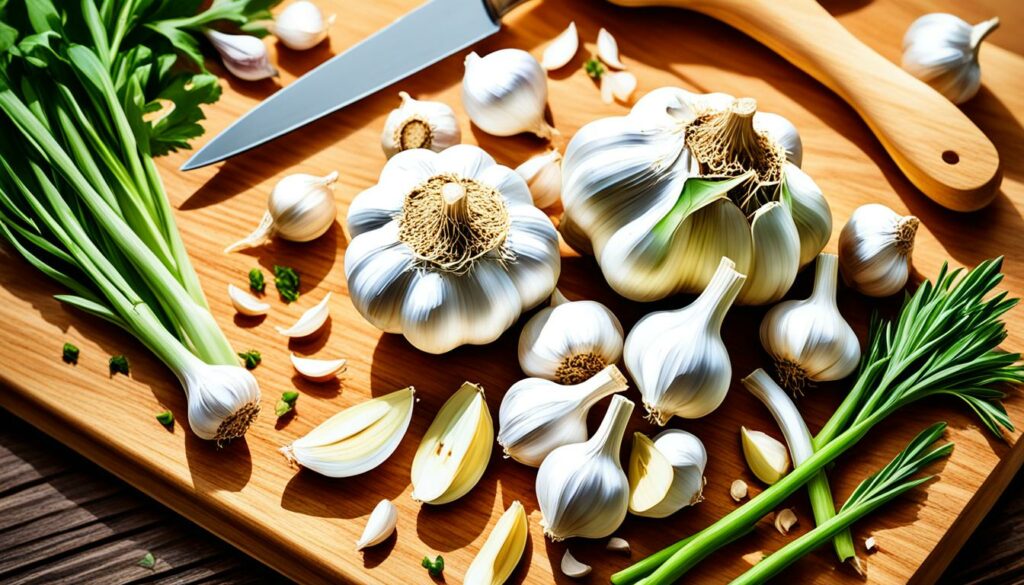
Turmeric: Nature’s Anti-inflammatory Spice
Turmeric, a spice popular in Indian cuisine, is not only known for its vibrant yellow color and distinctive flavor, but also for its potent anti-inflammatory properties. This natural remedy has been used for centuries in traditional medicine to reduce inflammation and promote overall health.
The key active compound in turmeric is curcumin, an antioxidant that has been extensively studied for its anti-inflammatory effects. Curcumin has been shown to block the activation of NF-κB, a molecule that promotes inflammation in the body. By inhibiting NF-κB, curcumin helps reduce the production of inflammatory markers that contribute to chronic inflammation.
Several studies have demonstrated the effectiveness of curcumin in reducing inflammatory markers such as interleukin 6 (IL-6), high-sensitivity C-reactive protein (hs-CRP), and malondialdehyde (MDA). These markers are indicators of inflammation and their reduction signifies an improved inflammatory response.
Not only does curcumin help reduce inflammation, but it can also provide pain relief similar to nonsteroidal anti-inflammatory drugs (NSAIDs) for individuals suffering from conditions such as osteoarthritis. Its ability to target multiple pathways involved in inflammation makes it a promising natural alternative to conventional medications.
Despite its numerous health benefits, curcumin is notoriously poorly absorbed by the body. However, there is a clever way to enhance its absorption. Combining turmeric with black pepper, specifically the compound piperine found in black pepper, can significantly increase the bioavailability of curcumin. Piperine inhibits certain enzymes in the liver, allowing higher levels of curcumin to enter the bloodstream and exert its anti-inflammatory effects.
To make the most of turmeric’s anti-inflammatory properties, curcumin supplements with black pepper extract are readily available. Incorporating turmeric into your daily routine may not only reduce inflammation but also provide other health benefits, such as enhanced antioxidant capacity and improved digestion.
Benefits of Turmeric for Inflammation:
- Reduces inflammatory markers such as IL-6, hs-CRP, and MDA
- Provides pain relief for individuals with osteoarthritis
- Enhanced absorption with black pepper for optimal effectiveness
- Promotes antioxidant capacity and overall health
- Easy to incorporate into daily routine through supplements or culinary use
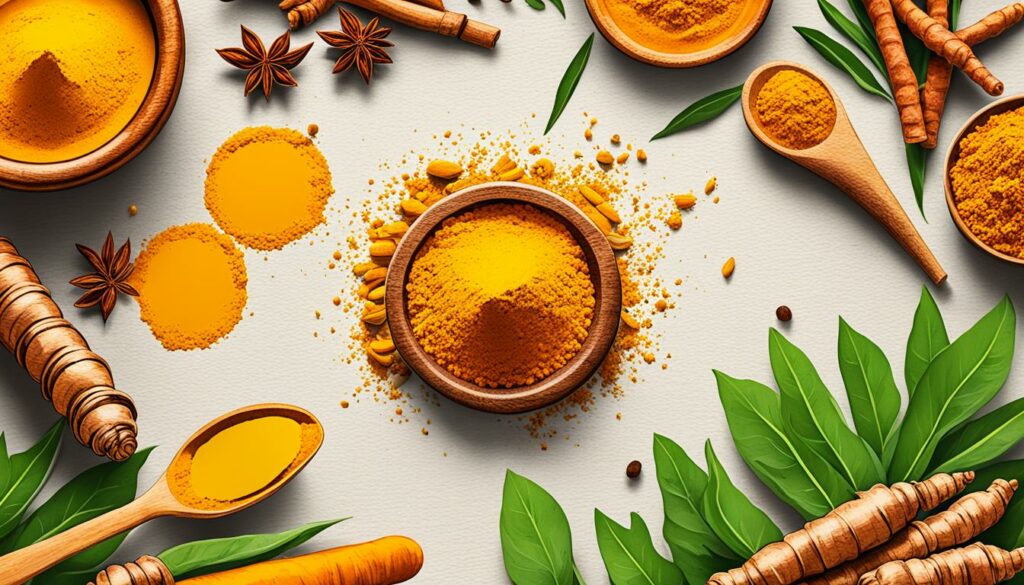
| Product | Curcumin Content | Black Pepper Extract | Recommended Dosage | Price Range |
|---|---|---|---|---|
| Turmeric Plus | 800 mg | Yes | 1 capsule daily | $20-$30 |
| Curcumin Max | 1000 mg | Yes | 2 capsules daily | $25-$35 |
| UltraCurcumin | 1200 mg | Yes | 1 capsule daily | $30-$40 |
Comparison of curcumin supplements with black pepper extract
Cardamom: An Aromatic Anti-inflammatory Spice
Cardamom, a spice native to Southeast Asia, is not only renowned for its delicious flavor but also for its potential anti-inflammatory benefits. Research has shown that cardamom can help reduce inflammatory markers such as C-reactive protein (CRP), interleukin 6 (IL-6), tumor necrosis factor-alpha (TNF-α), and malondialdehyde (MDA) in the body.
Several studies have specifically investigated the effects of cardamom in individuals with prediabetes and nonalcoholic fatty liver disease, conditions closely associated with chronic inflammation. The results indicate that consuming cardamom supplements can significantly lower inflammatory markers, improving overall health and reducing the risk of disease progression. Cardamom’s potent anti-inflammatory properties may also contribute to a reduced degree of fatty liver disease, ultimately supporting liver health.
Adding cardamom to your diet is easy and versatile. This aromatic spice can enhance the flavors of a variety of dishes, particularly curries and stews. Its warm and slightly citrusy notes offer a delightful sensory experience, making it a popular choice in culinary creations.
If you prefer a more convenient option, cardamom supplements in powder or capsule form are also available. These supplements can provide a concentrated dose of cardamom’s beneficial compounds and make it easier to incorporate into your daily routine.
Embrace the power of cardamom as a flavorful addition to your meals or as a convenient supplement to support your body’s inflammatory balance.
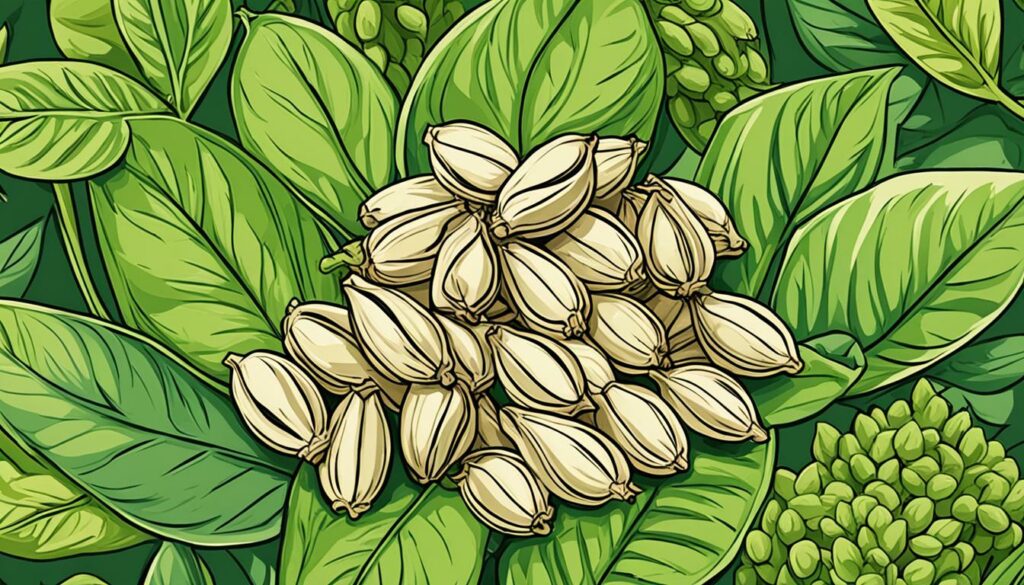
Black Pepper: The King of Spices for Inflammation
Black pepper, known as the king of spices, has been traditionally used to treat various health conditions. Its rich aroma and flavor make it a popular seasoning ingredient in kitchens worldwide. But did you know that black pepper may also have powerful anti-inflammatory properties?
Research suggests that black pepper’s active compound, piperine, may play a role in reducing inflammation in the body. Piperine has been found to reduce joint swelling and various inflammatory markers in animal studies. It shows promise in helping to reduce inflammation, joint swelling, and redness.
Although human research on the anti-inflammatory effects of black pepper is limited, incorporating this spice into your diet may still have a positive impact. By adding black pepper to your meals, you can enjoy its flavorful kick while potentially benefiting from its anti-inflammatory properties.

Whether you use freshly ground black pepper or pre-ground pepper, it is a convenient and versatile spice that can be added to a wide variety of dishes. From savory soups and stews to grilled meats and roasted vegetables, black pepper adds depth and complexity to any recipe.
Additionally, if you are looking for a more concentrated dose of piperine, piperine supplements are available on the market. These supplements contain a higher concentration of piperine and may offer a more targeted approach for managing inflammation.
Incorporate black pepper into your daily meals and experience the potential benefits of this humble spice. Spice up your life and reduce inflammation with the king of spices!
Ginseng and Green Tea: Herbal Allies for Inflammation
Ginseng and green tea, two powerful herbal remedies, have been found to offer natural relief for inflammation. Ginseng, a plant used in traditional Asian medicine, contains active compounds called ginsenosides, which have been shown to reduce inflammatory markers in the body. Additionally, ginseng has antioxidant and neuroprotective effects, making it a potent ally in fighting inflammation.
Studies have demonstrated that both Asian ginseng and American ginseng can effectively reduce inflammatory markers such as interleukin 6 (IL-6) and tumor necrosis factor-alpha (TNF-α). Consuming ginseng can be done through stewed roots or by taking ginseng extract supplements. These natural remedies not only help in reducing inflammation but also offer other benefits such as relieving pain, improving sleep, reducing fatigue and depression, and ultimately enhancing the overall quality of life.
Green tea, on the other hand, is rich in polyphenols, particularly epigallocatechin-3-gallate (EGCG), which has been extensively studied for its anti-inflammatory properties. Green tea has been found to reduce inflammatory markers and improve the quality of life of individuals with rheumatoid arthritis. It can be enjoyed as a beverage or taken in supplement form, allowing people to easily incorporate its anti-inflammatory benefits into their daily routine.
By harnessing the power of ginseng and green tea, individuals can explore herbal remedies to combat inflammation naturally. Whether through the consumption of Asian or American ginseng, or the incorporation of green tea into their diet, these plant-based alternatives offer a promising approach to reducing inflammation and improving overall well-being.

